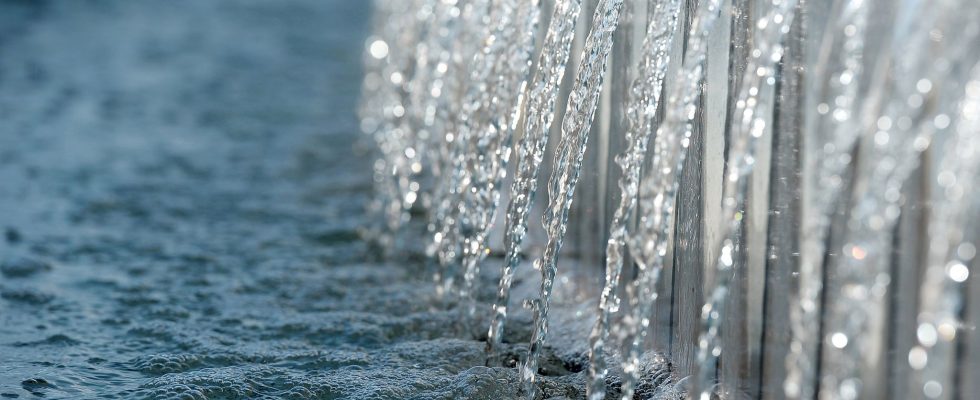This is one of the key measures presented by Emmanuel Macron, on March 30, in his “water plan”: treat and clean up wastewater to put it back in the circuit, and thus save millions of cubic meters. “Less than 1% of water is reused in France but we can do ten, fifteen, twenty times better”, assures the President of the Republic. Either the current performance of Italy or Spain. A speech, and a commitment, which can only delight Benoit Gillmann, the founder of Bio-UV Group, which in twenty years has become the French leader in water disinfection.
The story of this SME based in Lunel, in the Hérault, did not begin in a garage but in… a footbath. In 1999, Benoit Gillmann, a commercial in the medical sector, was looking for an alternative to chlorine for his daughter suffering from eczema so that she could bathe in the swimming pool. He then discovered the power of ultraviolet rays, a method of treatment still confidential at the time. It’s the click. And the beginning of a great success. With its 160 employees and its three production sites based in France and Scotland, Bio-UV has been able to broaden its range by developing two other systems complementary to ultraviolet rays: ozone and salt electrolysis.
From swimming pools to factories
These three devices are all based on natural reactions, without chemical additives. In a box called “reactor”, a lamp emits ultraviolet rays (UV-C) destroying viruses, bacteria, molds and algae… Once inside the reactor, the water comes out completely clean. Ozone is a gas found in the atmosphere. Dissolved in water using an ozonator, it becomes a highly effective disinfectant. As it degrades quickly, it has no impact on the environment. The icing on the cake, the combination of UV-C and ozone triggers a powerful oxidation reaction capable of eliminating toxic organic matter, heavy metals or drug residues. As for the electrolysis of salt, it is mainly used to disinfect swimming pools. The water, slightly salted beforehand by adding sea salt, passes through an electrolyser which transforms the salt into sodium hypochlorite, natural chlorine. This destroys algae and germs before turning back into salt under the effect of light.
“Initially, our activity was mainly aimed at private and municipal swimming pools, says the creator of Bio-UV. But we quickly understood that our field of intervention was much broader. Today, we design, manufacture and market systems which respond to issues as varied as the disinfection of aquaculture ponds or ship ballast [NDLR : réservoirs qui assurent l’équilibre de la coque et fourmillent de microbes], purification of drinking water, treatment of waste water or for industrial use. Our ambition is to develop the ‘Reuse’, this ability to reprocess water so that it can be reused for irrigation purposes, domestic or professional consumption, rather than being discharged into nature.”
Manufactured in Europe
In this market dominated by multinationals such as the American Xylem, the Canadian Trojan Technologies or the British Halma, Bio-UV and its 51 million euros in turnover are considered Tom Thumb. But after an initial public offering in July 2018 and a new fundraising in 2020, which brought in a total of 23 million euros, the company from Lunes was able to carry out two important acquisitions for its development: the Scottish company Triogen, a subsidiary of Suez and specialist in ozone treatment, and the French Corelec, expert in salt electrolysis.
At the beginning of March, Benoit Gillmann, 68, decided to hand over the reins to Laurent-Emmanuel Migeon, an agricultural engineer experienced in finance, who had accompanied him during the listing of Bio-UV on Euronext Growth, the dedicated stock market compartment. to SMEs. “95% of our components are manufactured in Europe, specifies the new CEO. We control the entire chain: our R&D team designs our systems and our factories produce them. Thanks to the responsiveness offered by our size, we We are able to offer tailor-made solutions to our customers such as Veolia, in the reuse of wastewater, Nestlé and Coca Cola, for the treatment of industrial water, or Corsica Ferries and MSC, for the treatment of ballast.”
The US Navy said banco
Since the entry into force in 2017 of an International Maritime Organization convention, all ships making international voyages are required to clean their ballast water of bacteria and other pathogens that may be discharged near the coast or in the ports. A buoyant business for Bio-UV, which has won a prestigious client. “We have designed prototypes which will soon be tested by the US Navy, rejoices Laurent-Emmanuel Migeon. Their boats could be equipped by 2026.”
If the company has so far managed its boat rather well in Europe, it is now essential, to draw its growth in the medium term, that it can impose itself on American territory. “A first attempt had been made via its subsidiary Delta UV, but it was not conclusive and ended with the sale of the latter in 2016, recalls Aurélien Taïeb, equity manager at Meeschaert AM. Now that the company has mastered all the disinfection technologies, it will be able to try its luck again via an acquisition or a joint venture with a company well established in the United States. And promote “made in France” beyond the oceans.
